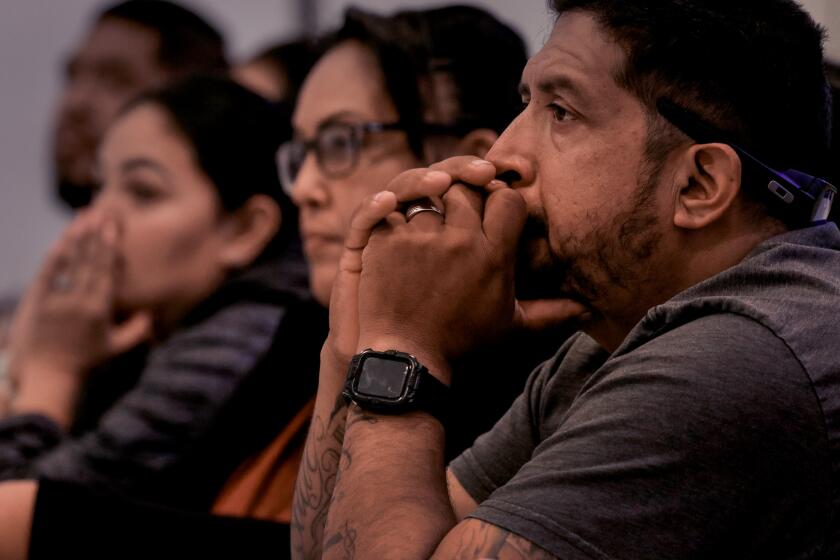Grass-roots immigration reform
Fundamental change usually proceeds from the bottom up, which is why it often blindsides most politicians and much of the media.
For example, the “tea party”-style rage that is this election cycle’s defining characteristic grows out of a broad, if inchoate, sense that the American economy no longer apportions prosperity or opportunity in anything close to an equitable fashion. As David Cay Johnston reported Monday, last year the 74 highest-paid Americans each earned an average of $519 million annually — or about $10 million a week. That was up from $92 million the year before. At the same time, every measure of ordinary Americans’ pay — total, average and median — fell from the previous year. Adjusted for inflation, median pay was actually less than it was 10 years ago.
Marriage equality is another question on which change is pushing up from the grass roots, with polls showing that increasing numbers of Americans now regard it as a civil rights issue. That’s overwhelmingly true among the young, no matter their region or background.
Something similar may be occurring when it comes to immigration reform. As a Times/USC poll reported Sunday, nearly half of California’s likely voters have a favorable view of immigrants, including those without papers. Fully 59% said that undocumented immigrants who have lived and worked here for at least two years should be allowed to remain. That’s particularly significant because California is home to more immigrants than any other state.
You could catch a glimpse of this new consensus Sunday at Dolores Mission Church in Boyle Heights, one of those places where the better angels of our city’s nature tend to speak most clearly. Dolores, set among public housing projects, is among Los Angeles’ poorest Roman Catholic parishes and long has been run by the Jesuits, the largest and most influential of the church’s religious orders. Sunday, hundreds of people of all ages and ethnicities — parishioners, students at the order’s schools and lay associates of its social justice initiatives — gathered to assist at a Mass on behalf of comprehensive immigration reform. As one of the celebrants, Homeboy Industries’ Father Gregory Boyle, put it, they were there to “to imagine a circle of compassion and then to imagine no one standing outside that circle.”
Afterward, Father John McGarry, the Mass’ principal celebrant and the Jesuits’ California superior, read a letter calling for comprehensive immigration reform signed by those present and sent to President Obama and members of Congress. Among the essential steps the Dolores declaration urges are “a path to legalization that ensures that undocumented immigrants have access to full rights; a legal employment structure for future workers that protects both migrants and U.S. workers; and expedited reunification and emphasis on family unity for all immigrants.”
The latter point carried a particular resonance Sunday because the most moving of the Dolores speakers was a middle-aged woman named Natividad, a Salvadoran immigrant who spoke of what her life and that of her six young children had been like since their father was deported. Afterward, Father Scott Santarosa, Dolores’ pastor, drew my attention to a wrenching aspect of the remarks she delivered in matter-of-fact Spanish: She spoke as though she no longer had a husband and of how her youngest sons believed their father dead.
On Monday, during an interview with the popular Spanish-language radio personality Eddie “Piolin” Sotelo, Obama blamed Republicans for blocking comprehensive immigration reform. That’s partly true. When congressional Republicans recently frustrated passage of the so-called DREAM Act, which would have provided a path to citizenship for some undocumented young people who attend college or serve in the armed forces, pollsters measured a steep increase in the enthusiasm of likely Latino voters.
It’s also true, though, that this administration’s enforcement of our broken immigration laws has been nothing short of draconian. This month, Obama’s Homeland Security secretary, Janet Napolitano, proudly announced that we deported a record number of people in the last fiscal year — some 1,080 men and women a day, or nearly 393,000 in all. Less than half of those people will have committed any crime other than being here without papers.
How many families, like Natividad’s, will be caught up in tragedy as a consequence? The Times/USC poll suggests that political expediency and common sense, at long last, may have begun to converge on this issue.
More to Read
Get the L.A. Times Politics newsletter
Deeply reported insights into legislation, politics and policy from Sacramento, Washington and beyond. In your inbox three times per week.
You may occasionally receive promotional content from the Los Angeles Times.










